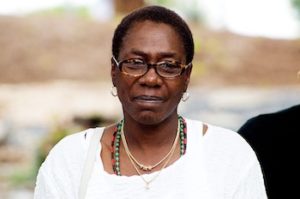
Afeni Shakur
*Afeni Shakur was born on this date in 1947. She was a Black political activist, author, and journalist.
Alice Faye Williams was born in Lumberton, North Carolina, the daughter of Rosa Belle, a homemaker, and Walter Williams Jr., a trucker. She had a sister, Gloria Jean. She had a troubled beginning and grew up resenting her father and men in general because he was abusive. She thought her mother was weak because she did not stand up against her father. At 11 years old, she, her mother, and her sister left her father.
They moved to the Bronx, New York, where she had difficulty adapting to the educational setting. Her teachers thought the High School for Performing Arts fit her. She attended Bronx High School of Science. She became interested in street life and called herself a street fighter and a member of the Disciple Debs in Harlem.
In 1968, at 21, she changed her name to Afeni Shakur; Afeni is a Yoruba word for "lover of people," and Shakur is Arabic for "thankful." She lived in Harlem, New York, and joined the Black Panther Party. She wrote the Black Panther Party Newsletter, Panther Post. She led a successful campaign that led the FBI to believe the party was fading. She became a section leader of the Harlem chapter and a mentor to new members, including Jamal Joseph, Cleo Silvers, and Dhoruba Bin-Wahad. She also worked with Billy Garland (Tupac's biological father) and Geronimo Pratt (who became Tupac's baptismal sponsor). In April 1969, she and several other Black Panthers were arrested and charged with several counts of conspiracy to bomb police stations and other public places in New York.
With bail set at $100,000 each for the 21 suspects, the Panthers decided to raise bail money first for Joseph and Shakur so that those two could work on raising bail for the others. Shakur had been effective in raising bail funds for jailed Panthers. The pre-trial started in February 1970 and was on September 8, 1970. Charges brought against her and the other members of the Black Panther Party were attempted murder, conspiracy to commit murder, conspiracy to bomb buildings, and conspiracy.
During the trial, the judge dismissed twelve out of the thirty charges. Shakur chose to represent herself in court. She was pregnant while on trial and facing a 300-year prison sentence, and she had not attended law school. Shakur interviewed witnesses and argued in court. She and the others in the "Panther 21" were acquitted in May 1971 after an eight-month trial. Altogether, Afeni Shakur spent two years in jail before being exonerated.
Her son, Lesane Parish Crooks, was born on June 16, 1971. In 1972, Lesane Parish was renamed Tupac Amaru, which means "shining serpent" in Quechua. The young Tupac was named after Túpac Amaru II, an indigenous insurgent leader of the Rebellion of Túpac Amaru II, a rebellion of the Inca against the Spanish in Peru that lasted from 1780–1783. After acquittal, she did not return to the Black Panther Party.
In 1975, she married Mutulu Shakur and had their daughter, Sekyiwa. They got divorced in 1982. She and her children moved to Baltimore, Maryland, in 1984. She raised her children through welfare and relocated to Marin County in California to manage her drug use. She overcame her addiction after she moved back to New York in 1991 with Narcotics Anonymous. Although Tupac struggled in his relationship with her, he paid tribute to her in his song "Dear Mama." In the song, he reflects on his childhood, acknowledges Afeni's troubles with addiction, and expresses his love for her: "You always was committed, A poor single mother on welfare, tell me how you did it. There's no way I can pay you back, But the plan is to show you that I understand: you are appreciated."
Her revolutionary ideas were reflected in Tupac's music. Before Tupac died, he arranged for her to receive $16,000 monthly and purchased a home in Stone Mountain, Georgia. She was also the co-executor of Tupac's estate. After her son's death, with revenue from his albums released posthumously, she founded the Georgia-based Tupac Amaru Shakur Foundation to provide art programs for young people and Amaru Entertainment, a holding company for all of Tupac's unreleased material. The foundation was sold shortly before her death. She also launched a fashion clothing line, Makaveli Branded.
In 2004, Shakur married Gust Davis Jr. In that same year, her biography, Afeni Shakur: Evolution of a Revolutionary, was released. In her biography, Afeni Shakur reflected on her childhood experiences, upbringing, and involvement in the Black Panther Party. In the book, she stated that the party educated and directed her to channel her anger. This gave her hope, which she mentioned she had never experienced. She spoke about how she met men who did not abuse Black women at the party. Through the party, she met Lumumba Shakur, agreed to be his second wife, and converted to Islam. She described her experiences in jail and how, together with other inmates, they organized a bail fund to get some of the women out of jail.
She was in federal court on July 20, 2007, to file an injunction to prevent Death Row Records from selling any unreleased material from Tupac after the company failed to prove that the unreleased songs were not part of its bankruptcy settlement. She made guest appearances and lectures. In February 2009, she gave the keynote address for Vanderbilt University's Commemoration for Black History Month. She shared her experiences and ways to overcome loss with people. Afeni Shakur Davis died at a hospital in Greenbrae, California, on May 2, 2016.